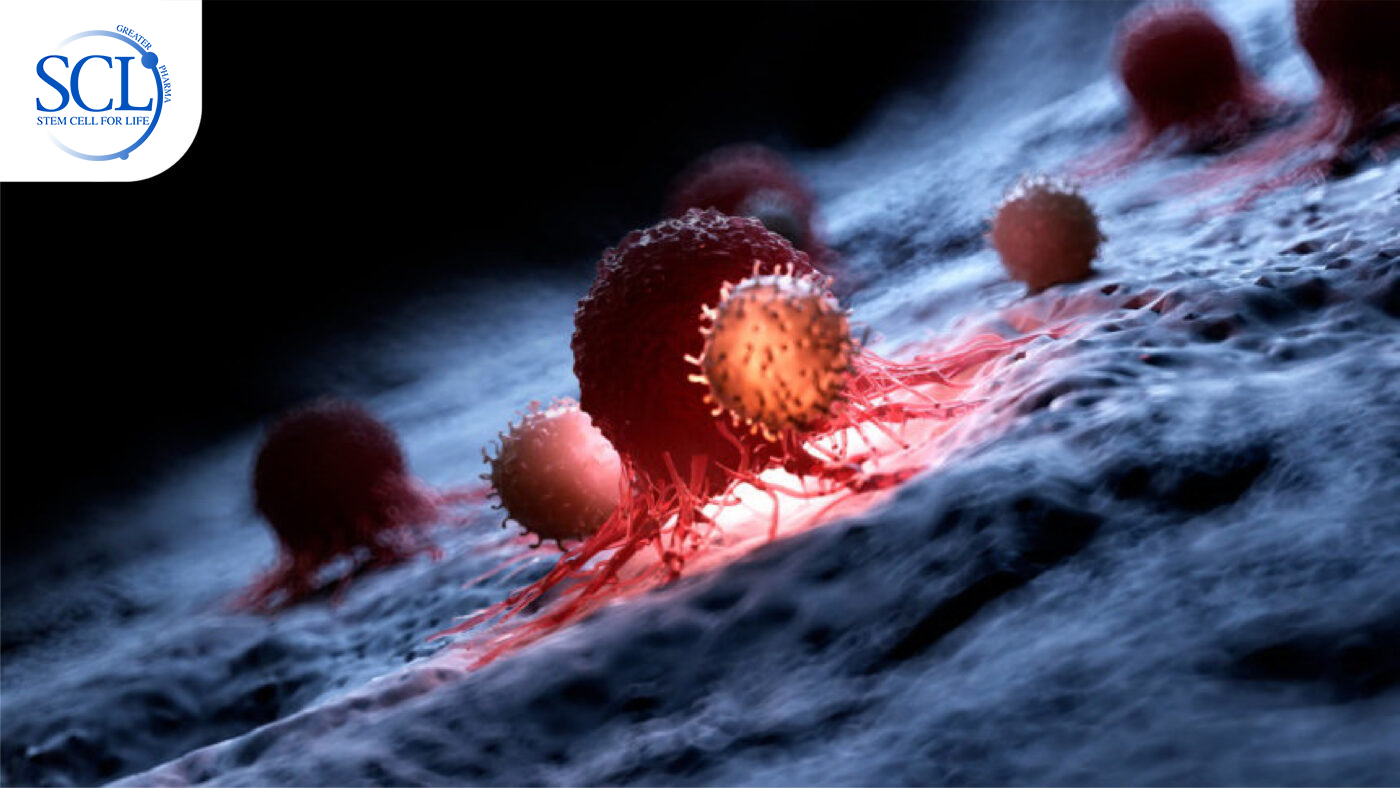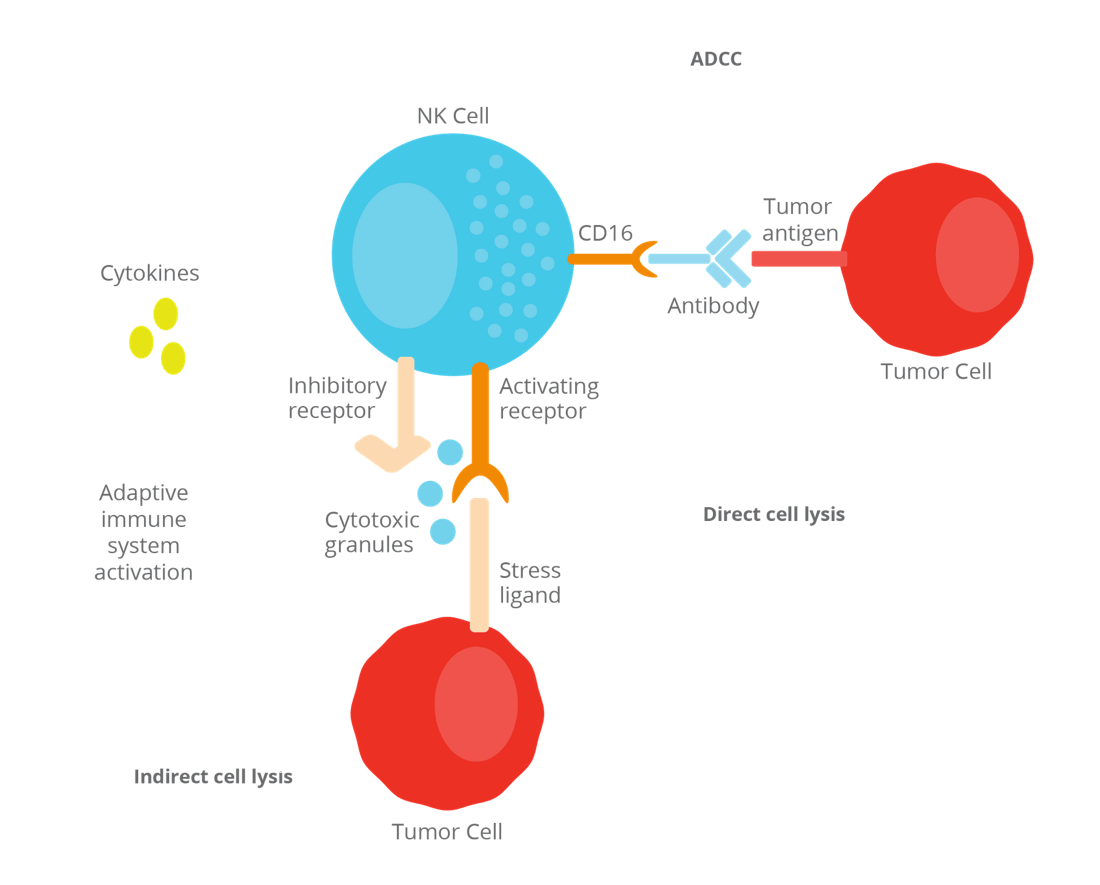

NK Cell
Natural Killer Cells, also known as NK cells, are a type of white blood cells (lymphocytes) and a crucial component of innate immune system, representing only 5–10% of circulating lymphocytes. NK cells represent the first line of defense against the virus-infected and malignantly transformed cells without any priming antigen stimulation or prior activation. Additionally, NK cells also produce a wide variety of cytokines that can modulate the function of other innate and adaptive immune cells.
The Roles of NK Cells in the Immune System
NK cells can detect and destroy infected or abnormal cells such as cancer cells based on signals from various cell surface receptors and without any specific antigens.
NK cells play an important role in the immune system by producing several cytokines to influence various other cell types such as Dendritic cells, T-cells, and B-cells, to enhance the immune response.
NK cells can target and eliminate cancer cells including cancer stem cells (CSCs) and circulating tumor cells.
NK Cell Mechanism
The regulation of NK cell function is mediated by surface receptors including activating receptors and inhibitory receptors. Whether or not the NK cells kill the infected cells depends on a balance of signals from activating receptors and inhibitory receptors on the NK cell surface.
Normally, NK cells can discriminate between normal host cells and infected cells by recognition of MHC class I molecules. Therefore, NK cells do not kill normal cells because they express adequate amount of MHC class I molecules on their surface. On the other hand, reduced levels of MHC class I expression is a frequent event in cancer cells.
NK Cell Activity
After NK cells detect infected or abnormal cells, they kill target tumor cells through several mechanisms as follows.
- 1. Direct elimination of target cells by releasing of cytotoxic granules containing granzymes and perforins.
- 2. Indirect elimination of target cells by secreting cytokines and chemokines secretion such as Pro-inflammatory cytokines upon target cell recognition
- 3. Antibody Dependent Cellular Cytotoxicity (ADCC) mechanism
SOURCE; HTTPS//FATETHERAPEUTICS.COM
NK Cells in Cancer Therapy and Prevention of Cancer Recurrence
NK cells are a type of white blood cells (lymphocytes) which can kill several cancer cells including blood cancers. To date, a few clinical trials on the efficacy of activated NK cell therapy on patients with cancerous tumors have been conducted (Oh S et al., 2019). Moreover, the early-stage cancer patients can be treated with activated NK Cell therapy together with standard treatments, such as chemotherapy, or with targeted therapy drugs, to increase the effectiveness of overall treatments with no negative effects on the main treatment (Xie, S et al., 2019). Some studies have demonstrated that chemotherapy drugs and targeted therapy drugs can help cancer cells better respond to NK cells and increase the effectiveness of NK cells at detecting and destroying cancer cells.
However, patients need to inform doctors about the chemotherapy dosing schedule and drugs to schedule the program of NK cell therapy and to identify suitable quantity of NK cells needed. Regarding patients with advanced cancers, NK cell therapy can be used as a single treatment to treat the patients with weak physical conditions and cannot be treated by chemotherapy, or it can be used with palliative chemotherapy to shrink cancer, control cancer-related symptoms, and help patients live longer with a good quality of life. As a result, the patients can spend quality time with their loved ones with the least risk of side effects from chemotherapy.
Moreover, NK cells can be used to treat patients who relapse after haematopoietic stem cell transplantation and do not respond to chemotherapy such as patients with acute leukemia (Cooley S et al.,2018). In addition, NK cells can help prevent the spread or recurrence of cancerous tumors (Oh S et al., 2019).
NK Cells for Restoring and Boosting the Immunity
Aging and underlying health conditions have great impact on the decrease of NK cell function or decreased NK cell activity, resulting in lower immunity. As a result, NK cells cannot destroy infected or abnormal cells (Oh S et al., 2019), which is associated with aging on the increased cancer incidence (Mandal A and Viswanathan C, 2015). Many studies have shown that NK cells play a crucial role in the immune surveillance of cancer and prevent the development of various cancers. Although measuring NK cell activity may not be able to identify the underlying diseases, the measured values can help doctors decide whether to have additional tests to find out potential health disorders or diseases. Therefore, highly activated NK cell therapy can help promote NK cell function to perform effectively which includes strengthening the immune system and increasing the possibilities to kill abnormal cells such as cancer cells and cells infected with viruses and bacteria as well as detecting and controlling early signs of cancer.
References:
1. Cooley S, Parham P, Miller JS. Strategies to activate NK cells to prevent relapse and induce remission following hematopoietic stem cell transplantation. Blood. 2018;131(10):1053–1062.
2. Mandal A, Viswanathan C. Natural killer cells: In health and disease. Hematol Oncol Stem Cell Ther. 2015;8(2):47-55
3. Oh S, Lee JH, Kwack K, Choi SW. Natural Killer Cell Therapy: A New Treatment Paradigm for Solid Tumors. Cancers (Basel). 2019 Oct 11;11(10). pii: E1534.
4. Shimasaki, N., Jain, A. & Campana, D. NK cells for cancer immunotherapy. Nat Rev Drug Discov, 2020;19, 200–218.
5. Valipour B, Velaei K, Abedelahi A, Karimipour M, Darabi M, Charoudeh HN. NK cells: An attractive candidate for cancer therapy. J Cell Physiol. 2019;234(11):19352-19365.
6. Xie, S.; Wu, Z.; Niu, L.; Chen, J.; Ma, Y.; Zhang, M. Preparation of highly activated natural killer cells for advanced lung cancer therapy. Oncol. Targets Ther. 2019, 12, 5077–5086.



